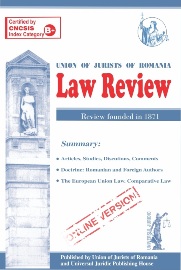SOVEREIGNTY AND INTEGRATION IN MODERN ERA. PERSPECTIVES
SOVEREIGNTY AND INTEGRATION IN MODERN ERA. PERSPECTIVES
Author(s): Vlad Alexandru Voicescu, Nicu Razvan DobarceanuSubject(s): Law, Constitution, Jurisprudence, Civil Law, International Law, Politics and law
Published by: Universul Juridic
Keywords: state; sovereignty; internal sovereignty; external sovereignty; independence; equality of states; behavioural sovereignty; interrelation;
Summary/Abstract: The term sovereignty conceived for a long period of time the idea of an ultimate and absolute authority in the political arena. At the end of the XIXth century and at the beginning of the XXth century international law scholars promoted a new concept of sovereignty, for example G. Scelle and subsequently Ch. Rousseau considered that sovereignty represents a sum of abilities which states can delegate in a higher or smaller degree to different international organisations. Although in essence it has a unitary character, within the content of the concept of sovereignty we can distinguish two component elements: external sovereignty and internal sovereignty. These two concepts realise the junction between municipal law and international law. From the international law perspective all states are sovereign and enjoy the same juridical capacities and functions. In principle each state can participate within international relations as equal partner, it can conclude treaties based on it’s free will, it can exclude any other state from interfering in it’s internal affairs, and it can govern the territory and control the boundaries. In fact, if we study carefully the international relations as a whole we will notice that not all states display the same degree of sovereignty. Highly developed states with robust institutions having a dominant position within the international plane are the ones enjoying the absolute behavioral sovereignty. The end of the XXth century and the beginning of the XXIst century was characterized by a scientifically and technical progress which created a unique informational space, deepen and diversified the international economical relations. These factors allowed the interrelation between states to extend to a global level, which entail us to question in what extent the content of the concept of sovereignty was affected. Can we interpret a treaty which imposes concessions for both parties as a restriction of their sovereignty? Or, can we consider that these treaties represent, in fact, a recognition and not a restriction of state sovereignty given that these treaties are voluntary creations. In conclusion we can assert that the international law legal system is nothing else but a foundation for states behaviour, created by themselves, and that is why there are no reasons to talk about the restriction, the destruction or the absorption of state sovereignty by the international law.
Journal: Law Review
- Issue Year: 2012
- Issue No: 04
- Page Range: 17-26
- Page Count: 10
- Language: English
- Content File-PDF

